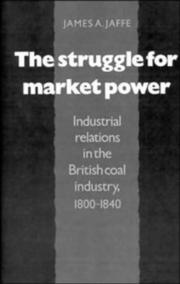| Listing 1 - 1 of 1 |
Sort by
|

ISBN: 0521391466 0521529417 0511528604 9780521391467 9780511528606 9780521529419 Year: 1991 Publisher: Cambridge: Cambridge university press,
Abstract | Keywords | Export | Availability | Bookmark
 Loading...
Loading...Choose an application
- Reference Manager
- EndNote
- RefWorks (Direct export to RefWorks)
During the Industrial Revolution, class relations were defined largely through the struggle to control the terms of exchange in the market. Integrating aspects of economic and social history as well as industrial sociology, this book examines the sources of the perception of the market on the part of both capital and labour and the elaboration of their alternative market ideologies. Of particular import is the argument that working-class culture expressed a fundamental acceptance of the utility of the market, a point that is supported by a detailed analysis of the labour process, workplace bargaining, and early-nineteenth-century trade unionism. The determination of market relations in this era therefore became a function of both class power and ideological prescription.
Collective bargaining --- Wages --- Piecework --- Coal mining industry --- History --- Coal miners --- Arts and Humanities --- Collective bargaining - Coal mining industry - England - History - 19th century. --- Wages - Coal miners - England - History - 19th century. --- Piecework - England - History - 19th century. --- Piece rate --- Piece-work --- Wage payment systems --- Compensation --- Departmental salaries --- Earnings --- Pay --- Remuneration --- Salaries --- Wage-fund --- Wage rates --- Working class --- Income --- Labor costs --- Compensation management --- Cost and standard of living --- Prices --- Bargaining --- Labor negotiations --- Industrial relations --- Negotiation in business
| Listing 1 - 1 of 1 |
Sort by
|

 Search
Search Feedback
Feedback About UniCat
About UniCat  Help
Help News
News